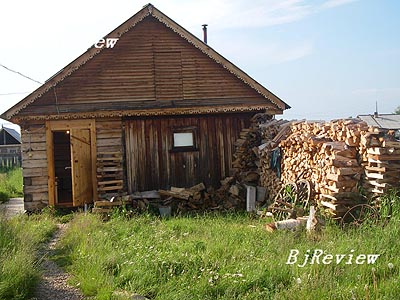
Expats often complain that upon befriending Asiatic people, hidden obligations, like unwanted cold sores, may pop forth unexpectedly. Rules are not clear; lines get crossed, misunderstandings occur. Certainly relationships are different where I live, not just because China is still developing but also because Asian culture encompasses an intimacy that is alien to modern Western societies.
This summer, while traveling with a Buryat family I discerned that the emotional rewards are well worth the obligations of friendship. My nomadic voyage through China, Mongolia and Russia's Buryatia (East Siberia) with my Inner Mongolian connections literally propelled me into a new emotional dimension.
Erezhena Gomarapovna is my best friend in China. She is Asiatic; I am white. Yet our souls are fundamentally alike: We both stride determinedly toward our goals graciously and stubbornly. We're both slightly plump, middle-aged, well-educated fashionistas and due to fate we rather expect good things to happen to us. A year younger than me, Erezhena's a little bossy; although I'm energetic-I'm passive, thus eager to follow her lead. Finally, it may sound somewhat strange but we both adore bathing: I'm Finnish-American and she's Russian-Buryat. So saunas, or "banyas", are big deals for us.
When my bathing buddy announced last month that her family was migrating back to Buryatia for half the year, my heart ached. After all, I'd spent hours with her family in their small, crowded but comfortable apartment. Almost daily I'd eaten her food, tutored her 10-year-old child, and even assisted her Mongolian husband in selling diamonds to U.S. jewelers. In return all of them had accepted me unconditionally, polished my Russian and Chinese, and given me, a solitary widow with no children, the ever so necessary sense of belonging to a family unit.
"Don't worry," my friend consoled me. "We'll be back in the winter, when Siberia is too cold. And besides, we're taking you with us. Stay as long as you like: My mother has made up a bed in Ulan Ude for you, and I want you to see Baikal; it's sacred to my people." As I gaped she grinned at me and explained, "Just get the visa; everything else I'll fix."
And she did. Erezhena arranged a car to drive us to the border. Her husband Zhargal's buddy escorted us across. And Zhargal himself had train tickets and a supply of bread and sausage to tide us over. In Ulan Bator, their distant relatives met us at the station. These hefty Mongolians carted us around in their huge SUV. We visited monasteries, consulted a lama, ate too much and had our nails manicured French style. Then, with Zhargal's friends we piled into the back of a plush Land Cruiser and drove through magnificent grasslands to Ulan Ude. In Buryatia the same friend, a prominent businessman, again acted as our private chauffeur, ferrying us to a prominent Buddhist temple, a dressmaker's shop, and a shaman's hut on the outskirts of town. The following day another of Zhargal's wealthy contacts, Gallina Vladimorovna, invited Erezhena and me home for dinner, a sleepover and a midnight bath. She requisitioned her driver, a huge bear-like man, to chauffeur us to the fancy Rovesnik resort on Lake Baikal. There we dined on raw omul, the famous fish only found in Baikal, and frolicked along pristine red sand beaches. The next afternoon we hitchhiked to Goriachinsk Village to visit a sanatorium and rest our feet in the hot springs. Along Baikal's endless white sand beaches Erezhena quickly found local banyas. We sat on fragrant cedar benches, sweating profusely and throwing water on the hot round rocks. When I could take it no more, I would stumble outside and throw myself into Baikal's cold, cold water, only to hear my friend yell, "Again! Dive in again! Then sit in the banya with me. I will beat you with birch leaves so your blood will flow cleanly."
In the West trips are generally planned; budgets are set; reservations are made. Yet my roaming pleasure trip cannot be labeled anything but serendipitous; nothing seemed truly planned on this magical tour and I spent pennies. Even on the return journey another friend of the family loaded me up in his jeep for the trip back to Ulan Bator. Instead of dropping me off at a hotel my burley driver, Amgalan, took me home to his grandmother, an 80-year-old granny who declared I should eat double portions because "You are too thin, too white, too tired."
"What shall I say? Nomads consider our friends more valuable than money or material goods," Erezhena patiently explained. "We just help each other and do not count the cost or the time. Life is too short to quibble, it must be shared."
The author is a journalist living in Beijing |
